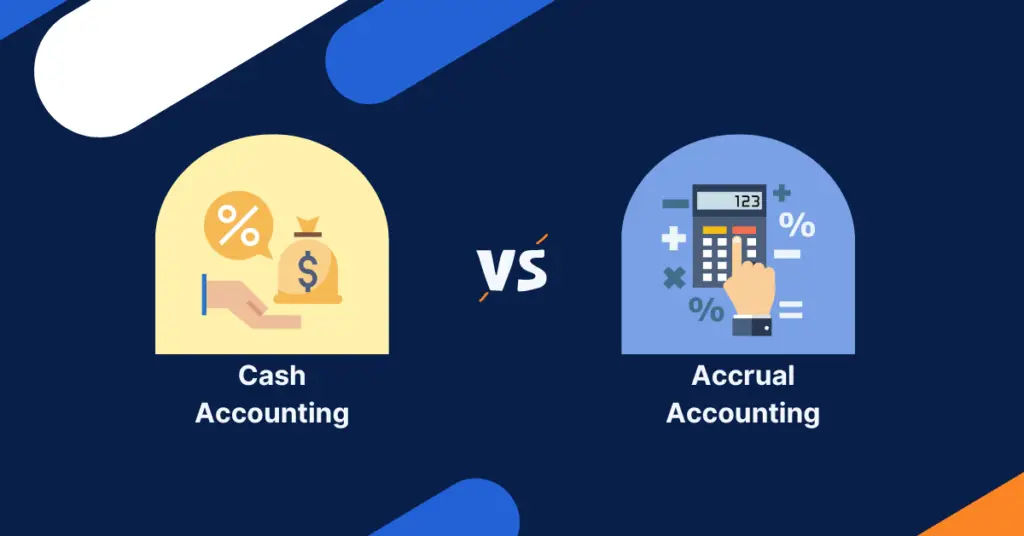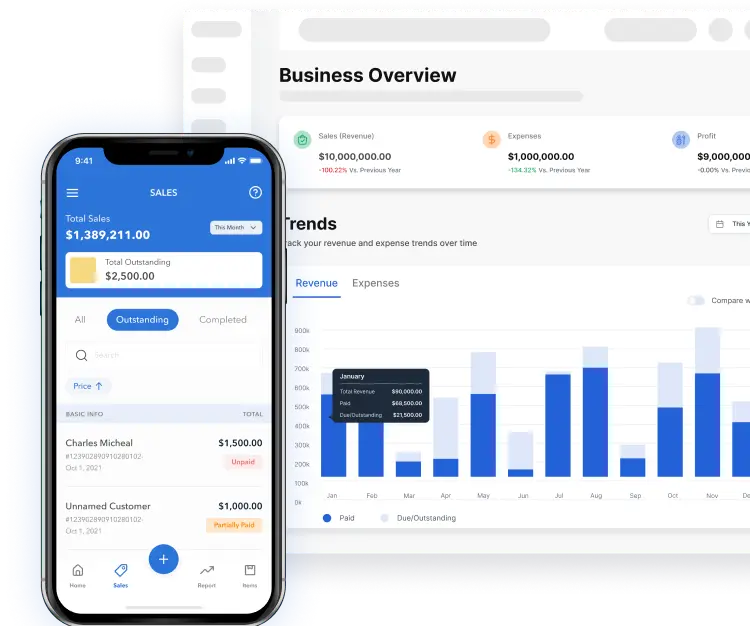Businesses use two primary methods to record their financial transactions: cash accounting and accrual accounting. Cash accounting vs. accrual accounting – what is the difference? Each approach offers distinct advantages and considerations that can significantly impact your business’s financial health and reporting accuracy. In this guide, we’ll explain cash and accrual accounting, helping you choose the best approach for your business.
What is Cash Accounting?
Cash accounting is the recording of financial transactions based on actual cash movements. In this approach, income is recognized only when cash is received, and expenses are recorded when payments are made. Small businesses and sole proprietors often favor this method due to its simplicity and immediate visibility of available cash.
Example:
Imagine you own a small retail store that sells clothing. You make a sale of $1,000 worth of merchandise to a customer on December 30th, 2022, but the customer pays you on January 10th, 2023.
With cash accounting, you record $1,000 revenue in January 2023 when you actually receive the payment in cash. The revenue is recognized when the cash changes hands.
Related posts: Cashbook template for logging cash transactions and how to calculate profits.
What is Accrual Accounting?
Accrual accounting is a complex method that records transactions when they happen, regardless of cash flow. This method gives a better idea of how well a business is doing financially. It looks at when money is made and when expenses happen, even if no cash has been exchanged yet.
Example:
Continuing with our clothing store scenario. Imagine you own a small retail store that sells clothing. You sell $1,000 worth of merchandise to a customer on December 30th, 2022, but the customer pays you on January 10th, 2023.
With accrual accounting, you would recognize the revenue of $1,000 on December 30th, 2022, when the sale is made, even though you have yet to receive the cash. This reflects the economic activity of the business accurately, as the sale has taken place.
Related post: Income statement template for tracking revenue
Cash accounting vs. accrual accounting – what is the difference?

The primary differences between cash and accrual accounting lie in when transactions are recorded and how they reflect on financial statements.
- Cash accounting focuses on cash movements, recognizing revenue and expenses when cash is exchanged.
- Accrual accounting aims to reflect economic activity more accurately, recognizing income when it is earned and expenses when they are incurred, regardless of when cash changes hands.
The choice between cash and accrual accounting depends on the financial reporting objectives of the business and any regulatory requirements it needs to follow.
Pros and Cons of Cash and Accrual Accounting
Both cash and accrual accounting methods have their advantages and disadvantages. The choice between them depends on factors such as the size of your business, the complexity of your financial transactions, and your reporting needs.
| Cash Accounting | Accrual Accounting | |
| Pros | – Simplicity and ease of use.- Immediate cash visibility.- Effective for small businesses and sole proprietors. | – Limited financial insight; doesn’t adhere to GAAP.- May not accurately represent long-term financial health. |
| Cons | – Reflects real-time financial health.- Adheres to Generally Accepted Accounting Principles (GAAP).- Provides a more comprehensive financial view. | – Complexity; requires thorough bookkeeping.- May not show actual cash position. |
When to Consider Cash Accounting
Smaller businesses and sole proprietors often prefer cash accounting due to its straightforward nature and immediate cash visibility. It’s also suitable for companies with relatively straightforward financial transactions and when tax implications are a primary concern. Here are some short-term and long-term considerations:
Short-Term Considerations:
- Simplicity: Cash accounting can simplify your bookkeeping process if your small business has relatively straightforward financial transactions.
- Immediate Cash Focus: If you need to monitor your cash flow daily closely, cash accounting provides an accurate picture of your available funds.
- Tax Simplification: Cash accounting can be advantageous for tax purposes, especially if you want to defer tax payments by recognizing income when it’s received.
Long-Term Considerations:
- Tax Timing: If you anticipate having fluctuations in your income from year to year, cash accounting allows you to manage your tax liability more effectively.
- Sole Proprietorships: If you’re a sole proprietor or own a very small business, cash accounting can provide a clear snapshot of your finances without the complexity of accrual methods.
- Real-Time Insights: If you want to understand the actual cash position of your business at any given time, cash accounting offers immediate visibility.
- Less Administrative Overhead: Cash accounting simplifies the process if you want to reduce the administrative burden of tracking accounts payable and receivable.
However, it’s important to note that while cash accounting has benefits, it may provide a partial picture of your business’s long-term financial health. As your business grows and becomes more complex, you may need to transition to accrual accounting to adhere to Generally Accepted Accounting Principles (GAAP) and provide a more accurate representation of your financial status.
When to Consider Accrual Accounting
Accrual accounting is a more accurate method for businesses that want a comprehensive understanding of their financial position, especially those with more complex transactions. While it requires a deeper level of bookkeeping, it adheres to Generally Accepted Accounting Principles (GAAP) and offers a clearer picture of income and expenses over time. Here are short-term and long-term reasons to consider it.
Short-Term Considerations:
- Accurate Financial Picture: Provides a more comprehensive view of your business’s financial health, capturing revenue and expenses as they are earned or incurred, even if cash has yet to change hands.
- Complex Transactions: If your business engages in complex transactions involving credit terms, multiple revenue streams, or significant accounts payable and receivable, accrual accounting ensures accurate tracking.
- Legal or Regulatory Requirements: It may be necessary to comply if your business follows Generally Accepted Accounting Principles (GAAP) or other industry-specific accounting standards.
Long-Term Considerations:
- GAAP Compliance: If you plan to seek external financing, investment, or partnerships, using accrual accounting helps you align with standardized accounting practices and enhances credibility.
- Business Growth: As your business expands, accrual accounting provides a clearer picture of your financial performance and allows for better long-term planning.
- Accurate Profitability: It matches revenue and expenses in the period earned or incurred, more accurately representing your profitability.
- Future Tax Planning: It can offer better insight into your future tax obligations, helping you plan for tax payments more effectively.
- Credibility with Stakeholders: Accrual accounting provides a more transparent view of your financial situation to investors, lenders, and stakeholders, fostering trust.
- Consistent Reporting: It ensures consistent reporting over time if your business operates across multiple periods and has varying revenue streams.
While accrual accounting offers these benefits, it may require more meticulous record-keeping and accounting expertise. Consider transitioning to accrual accounting if your business experiences growth and complexity or aims for greater financial transparency and compliance with industry standards. Remember that cash and accrual accounting should be chosen based on your business’s unique needs and long-term goals.
How Vencru Can Help Automate Your Accounting
Whether you opt for cash basis accounting or accrual basis accounting, Vencru has you covered. Our accounting software empowers small businesses and sole proprietors to manage their finances efficiently. From recording income and expenses to generating income statements or tracking accounts receivable or accounts payable, Vencru simplifies the process, allowing you to focus on growing your business.
By automating essential accounting tasks, Vencru ensures accurate record-keeping and provides valuable insights into your financial activities. This helps you make informed decisions, pay taxes on time, and clearly understand your bank account’s bottom line. Additionally, Vencru offers the flexibility to switch between cash basis and accrual accounting, ensuring you’re always in control of your financial strategy.
In Conclusion
The choice between cash and accrual accounting largely depends on the nature of your business, its financial activities, and long-term goals. While cash accounting offers simplicity and immediate cash visibility, accrual accounting provides a more comprehensive view of your financial health. Regardless of your choice, Vencru’s accounting software is designed to streamline your accounting processes, ensuring accurate financial reporting and empowering your business’s growth.
Make the right financial decisions for your business. Sign up or log in to Vencru today and experience the benefits of simplified accounting and financial management. Your bottom line will thank you.






